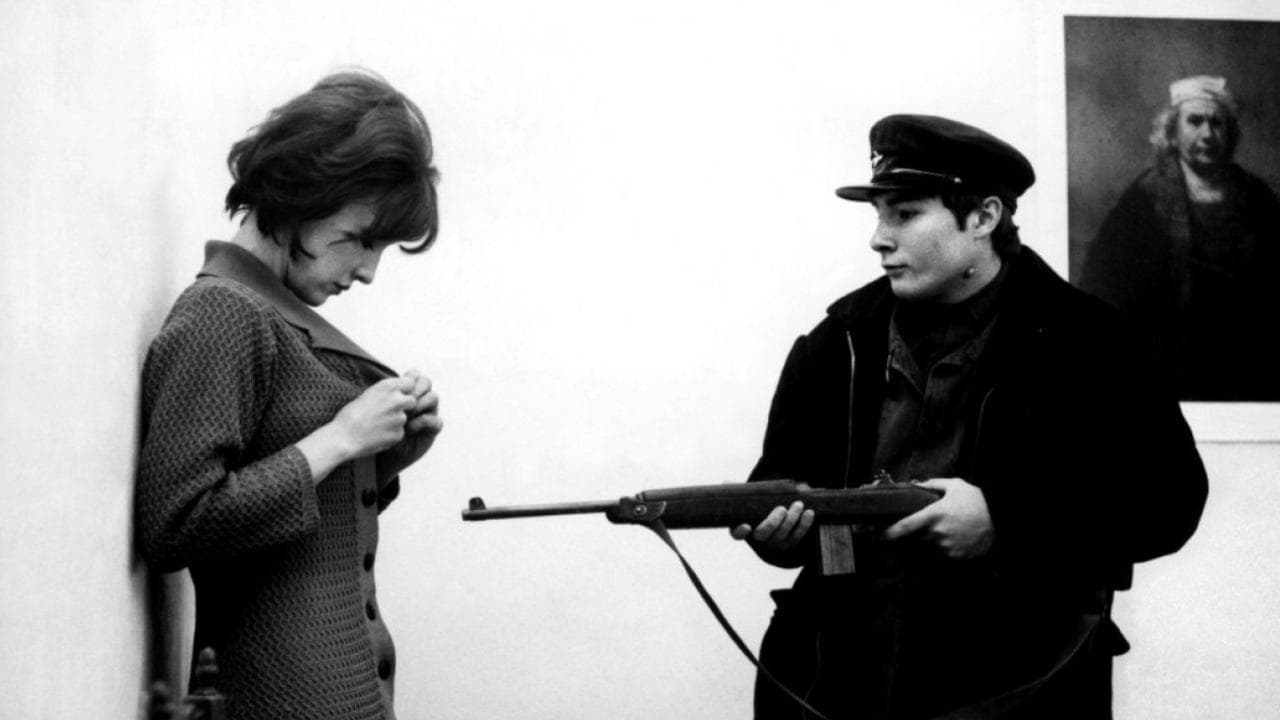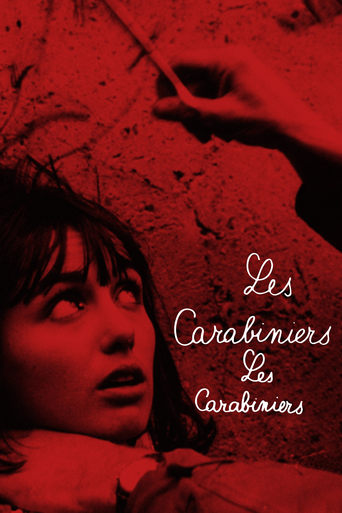

Compare this with "Le Mepris." One is a wonderful meditation on film-making saturated with the director's one personal issues. It shouldn't work, but it does, and spells out a real talent. The other is an absurdest's take on war and the ignorant and animalistic impulses that it spawns. This also shouldn't work, and it doesn't. All the cinema-verity arguments in the world aren't going to change the fact that the film sets out to create a wholly unconvincing argument for the absurdity of war.Perhaps as a 60's French director, Godard wasn't as immune from the vogue political ideas of the time as we might like to think, and this might be him purging it from his cinematic career. And something might be said for the film as encompassing a movement that the director himself doesn't even need to agree with.But, as Truffaut pointed out, it may be just as hard to film a satire on war as it is to make a decent adaptation of "The Odyssey." 3 out of 5 - Some interesting elements
... View MoreOne of the main things to bear in mind when watching Les Carabiniers is the context in which the film was made. Le Mépris, widely regarded as Godard's finest film, was made in the same year 1963; and it is clear in Le Mépris how much time was spent to attain perfection in composition. So Les Carabiniers can be seen as something of an experiment a rough and ready look at one of life's grittiest subjects, war, a stark contrast to the passion of Le Mépris.The intertitles play a very important role in the film, both enabling communication between the soldiers and their wives and giving an important sense of passing time. The handwriting used gives a sense of personal feeling but at the same time the often short and factual text always addressed 'On', as if the feelings of both brothers can be captured in a few words, renders them highly impersonal. The other interesting quirk is the final intertitle being handwritten despite it clearly not being written by the brothers making it almost an epitaph.The cohesive device of postcards is important in the film, one is used to encourage the brothers to join, the postcards that are acquired by the end of their service are for them the riches of the world and the way in which they are thrown into the air makes them seem almost like the money they are seeking in a scene borrowed from heist films. Godard also uses the postcard collection to be a brief encyclopedia of the world through methods of transport, animals, monuments etc. ultimately trivialising it though into something only worth a few seconds of attention.The slightly broader device of images and art is seen throughout the film, the vanity in the wives created by the magazines is clearly frowned upon; their names Cleopatre and Venus clearly demonstrating what they aspire to. The excitement with which they greet the new magazines and subsequent humour when the underwear adverts are held up to their bodies demonstrates a clear disdain for the materialism which they encourage. The artwork that the brothers see in a house that they pillage however is treated with the utmost respect, and Michel-Ange utters the words "un soldat salut un artiste". This really means two things, that contemporary popular life contributes nothing to culture, and maybe a personal comment from Godard on the necessity of education in artistic appreciation.The anti-materialistic message can also be seen in the attitude of the wives, in encouraging their husbands to go and fight and in their reception of their husbands on their return, asking first of all where their treasures are.The mis en scene plays a very important role in the atmosphere of the film; the techniques used being almost the antithesis of the polished style of Hollywood. The camera is virtually never static and Godard appears not to have used a tripod on the whole even in the establishing shots, this gives the film a sense of realism and almost documentary style where the camera is following the action as it happens. The poor quality film stock adds to this, shunning both colour and resolution to give an unglamourous view of war.The editing of the film is also very unusual; some cuts seem to break down the continuation of relation that is understood in the grammar of cinema. One of the slightly odder examples is when Ulysses is seen in a medium close-up firing his rifle into the air there is then a cut to library footage of plane taken from another plane, and a quick cut back to Ulysses suggesting that he was firing at the plane when the images seem so clearly disassociated. Another example is when one of the carabiniers at the end of the film says "Je vais vous expliquer" in a shot where he can be seen with the two brothers in a medium shot, there's then an edit with a few empty frames and a close up of the carabinier repeating the same line. The sound is very often dubbed a few frames too soon or late and there is often no sound at all when ambient sound would be appropriate. The disjointed nature seems to be a distinct and deliberate effort to make the filming of war as brutal as possible.The reality of the war is something quite interesting and strange in the film as only two of the enemy soldiers are seen during the first 45 minutes of the film, there are however many seemingly innocent civilians harassed and killed. In fact the only time that actual fire fights are seen taking place is after the war is over for the two brothers and they are out to get their rewards, the only point at which they no longer have their rifles. The scene in which they are killed by one of the carabiniers suddenly reverses the contempt the audience has towards the brothers in that they have only signed up as mercenaries with no care to what they are doing, seeking to use to army to fulfill their material desires. It is then clear that in fact they have been used to satisfy the desire of the king, and this leaves a very bitter taste in the mouths of the audience.The film is however not entirely depressing, and the scene in which Michel-Ange discovers cinema is one of the most enjoyable. The film was described by one critic at the time a homage to Lumière's films, and while it can be seen in the visual style throughout the film, the short in which a train can be seen entering a station and provokes a reaction of fear from Michel-Ange is a more direct link. The scene in which he falls through the screen while trying to interact with the film, is something that anyone who has ever seen a film will understand and sympathies with, conveying a palpable sense of naivety.There are many quirks in the film that are never really explained but serve to illustrate the bizarre situations that war creates. The sequence with the Mexican woman, the fireworks display filmed in negative, the mysterious other man with the wives who scurries away upon the return of the brothers and the poem recited by the girl in front of the firing squad.Using a combination of humour, the march down the frozen river, and pathos, the newsreel footage of dead soldiers, Godard effectively conveys the reality and unreality of war and most importantly in the end how no one benefits.
... View MoreAfter catching this film on Turner Movie Classics last night I wondered what all the fuss was about. I remember hearing and reading about this film in the 70's and 80's as being one of the great grand-daddy's of anti-war genre. After sitting though it, all 85 minutes of agony, and hoping that every minute that this film will get better, I realized that this is simply a poor film. My expectations were higher, considering what these writers/directors had produced (Jules and Jim, Contempt, Weekend, The Wild Child, etc.) but what came out was worse than some sort of no or low budget sophomoric attempt to make a statement that fails. Even the attempt at humor, one of the brothers at his first movie, became a very cheap and childish shadow of Chaplin.About 1/3 of the way through I simply gave up caring about either one of the brothers (or their moronic wives) and stuck with the film simply because I hoped that there would something that would elevate it from putting it the same class as two 10 year olds who got a hold of daddy's movie camera. It never did. Even the cast members who had lesser roles, the car salesman, the Italian woman, the communist girl, etc., all looked as bored as I felt. The young communist girl actually looked happy to be killed just so she could get out of this mess.Plan 9 From Outer Space, move over.
... View MoreWhat an amazing film.From the opening notes of the military march, to the final scene,this is a harrowing ride through the landscapes of "soldiers pay."There is nothing slick or overproduced here,thank Godard. The use of actual letters from French soldiers in wars from 1812 to ww2, is a masterstroke that effectively ties the scenes together.This could be a documentary and is done in this style.This works very well with the vintage newsreel images that are also used to tie the scenes.If you are looking for a RAMBO type war -adventure,go rent a Chuck Norris film.If you are a serious fan of the war/anti-war genre,do not miss this one!
... View More